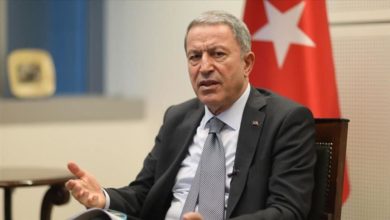PKK presence in Syria grows to fill power vacuum
 The presence of the Kurdistan Workers’ Party (PKK) has dramatically increased in Syria’s restive northern provinces as the group looks to build ties with Syrian President Bashar al-Assad and capitalize on the chaos that has gripped Syria for nearly a year.
The presence of the Kurdistan Workers’ Party (PKK) has dramatically increased in Syria’s restive northern provinces as the group looks to build ties with Syrian President Bashar al-Assad and capitalize on the chaos that has gripped Syria for nearly a year.
Local sources indicated to Today’s Zaman on Thursday that a 150-person PKK camp has been established in the Ra’s al-‘Ayn district of Syria, a border province that sits across the border from the southeastern Turkish province of Sanliurfa.
Reports from the northern district of Afrin, which includes the second-most populous Syrian city, Aleppo, suggested on Thursday that the PKK had begun to set up roadblocks and monitor traffic along rural roads in the province.
The reports come amid predictions in recent months that an alliance between the embattled Syrian president and the terrorist group would form in response to Turkey’s growing support for Syria’s anti-regime movement. In a Today’s Zaman column last week, Ali Othman of the Turkish-Kurdish Studies Center in Iraq predicted that the PKK was working to “repair its old alliance with the Syrian regime” given the group’s fear of growing Turkish influence among Syria’s political opposition and worries over a possible Turkish intervention in Syria.
PKK plans to operate out of Syria have been given added urgency, stated Othman, given the intense pressure that Turkish military strikes and increased cooperation between Ankara and Iraqi Kurdistan has put on PKK operations in northern Iraq, the current base of the terrorist group’s operations.
The Syrian government warned in October that it would support the PKK if it perceived that Turkey were supporting the Syrian opposition, with Assad stating that Turkey’s “hostility will backfire” and that “Turkey could fall into a state similar to ours” if it opposes Damascus.
Yet while Ankara has dismissed Assad’s thinly veiled threat of facilitating internal conflict in Turkey, it has had little say over a developing alliance between the Syrian regime and the PKK or the two groups’ increasing attacks against anti-regime Kurdish political leaders in northern Syria.
On Feb. 10, the body of abducted Syrian Kurdish politician Sherzad Hac Reshid was found near the northern Syrian city of Allepo, the latest in a long list of opposition Syrian Kurdish politicians who have been murdered in recent months.
Twenty-four-year-old Reshid, the director of the Kurdish Syrian Democratic Union Party (PYD) was abducted on Feb. 9 as he made his way from Allepo’s al-Amal hospital to the city’s PYD headquarters. His body was found the next day, and although his abductors have not yet been identified, friends of Reshid told Today’s Zaman on Thursday that the assassination was likely the work of Syrian security forces.
The perpetrators behind the attack nevertheless remain unknown, as Reshid in recent months had become an outspoken member of the PYD, the political extension of the PKK within Syria, and had on a personal Internet site and in numerous demonstrations demanded that Syria’s Kurds back the nationwide anti-Assad movement.
Such views were contrary to the political agenda of the PYD, which has remained firmly pro-Assad and is member of the National Coordination Committee (NCC), an umbrella of political groups within Syria which has demanded government reforms but called for dialogue with, rather than the ouster of, Syrian President Bashar al-Assad.
Resid’s death was preceded on Feb. 8 with the near assassination of Abdullah Bedro, the chief of a Kurdish tribe in northern Iraq and an opponent of the Assad regime. The attack, in which Bedro’s three sons were killed, is believed to have been carried out by Mahmut Muhammed, a known PKK operative.
In October of last year, respected Syrian Kurdish politician and rights activist Mashaal Tammo was killed at his home in Syria’s northeastern city of Qamishli. Speaking to Today’s Zaman on Wednesday, Ibrahim Guclu, a Kurdish politician and founder of the Rights and Freedoms Party (HAK-PAR), said that Tammo’s murder may also have been orchestrated by the PKK. At the time of his killing, Tammo’s death was largely attributed to Assad’s security forces. Tammo was a member of the Syrian National Council (SNC), Syria’s largest anti-Assad political group.
The PKK once had an extensive presence in Syria, operating training camps on the Syrian-Turkish border from the early 1980s to the late 1990s. The country hosted PKK leader Abdullah Ocalan for a number of years but ended its support for the PKK shortly after Ocalan’s capture in 1999.
Turkey has uniformly condemned the Assad regime and the PKK in recent weeks, with Turkish Foreign Minister Ahmet Davutoglu saying during a Feb. 9 speech at George Washington University that both groups were “outdated regimes and structures” from the Cold War that will soon be a part of history. (TZ)
[adrotate group=”9″]



Kurds deserve freedom